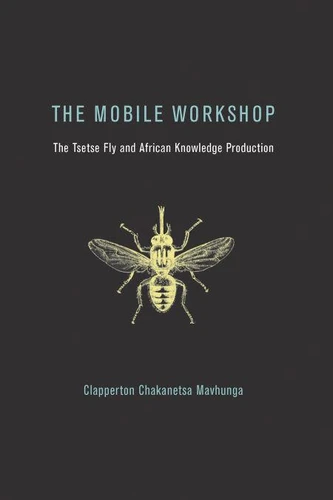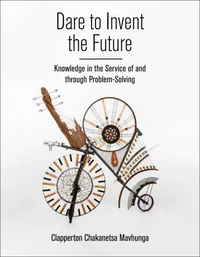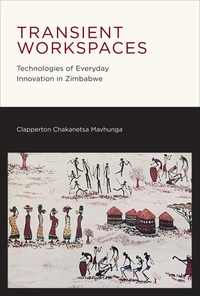The Mobile Workshop. The Tsetse Fly and African Knowledge Production
Par :Formats :
Disponible dans votre compte client Decitre ou Furet du Nord dès validation de votre commande. Le format ePub protégé est :
- Compatible avec une lecture sur My Vivlio (smartphone, tablette, ordinateur)
- Compatible avec une lecture sur liseuses Vivlio
- Pour les liseuses autres que Vivlio, vous devez utiliser le logiciel Adobe Digital Edition. Non compatible avec la lecture sur les liseuses Kindle, Remarkable et Sony
- Non compatible avec un achat hors France métropolitaine
 , qui est-ce ?
, qui est-ce ?Notre partenaire de plateforme de lecture numérique où vous retrouverez l'ensemble de vos ebooks gratuitement
Pour en savoir plus sur nos ebooks, consultez notre aide en ligne ici
- Nombre de pages430
- FormatePub
- ISBN978-0-262-34586-6
- EAN9780262345866
- Date de parution01/06/2018
- Protection num.Adobe DRM
- Taille5 Mo
- Infos supplémentairesepub
- ÉditeurThe MIT Press
Résumé
How the presence of the tsetse fly turned the African forest into an open laboratory where African knowledge formed the basis of colonial tsetse control policies. The tsetse fly is a pan-African insect that bites an infective forest animal and ingests blood filled with invisible parasites, which it carries and transmits into cattle and people as it bites them, leading to n'gana (animal trypanosomiasis) and sleeping sickness.
In The Mobile Workshop, Clapperton Chakanetsa Mavhunga examines how the presence of the tsetse fly turned the forests of Zimbabwe and southern Africa into an open laboratory where African knowledge formed the basis of colonial tsetse control policies. He traces the pestiferous work that an indefatigable, mobile insect does through its movements, and the work done by humans to control it. Mavhunga's account restores the central role not just of African labor but of African intellect in the production of knowledge about the tsetse fly.
He describes how European colonizers built on and beyond this knowledge toward destructive and toxic methods, including cutting down entire forests, forced "prophylactic" resettlement, massive destruction of wild animals, and extensive spraying of organochlorine pesticides. Throughout, Mavhunga uses African terms to describe the African experience, taking vernacular concepts as starting points in writing a narrative of ruzivo (knowledge) rather than viewing Africa through foreign keywords.
The tsetse fly became a site of knowledge production-a mobile workshop of pestilence.
In The Mobile Workshop, Clapperton Chakanetsa Mavhunga examines how the presence of the tsetse fly turned the forests of Zimbabwe and southern Africa into an open laboratory where African knowledge formed the basis of colonial tsetse control policies. He traces the pestiferous work that an indefatigable, mobile insect does through its movements, and the work done by humans to control it. Mavhunga's account restores the central role not just of African labor but of African intellect in the production of knowledge about the tsetse fly.
He describes how European colonizers built on and beyond this knowledge toward destructive and toxic methods, including cutting down entire forests, forced "prophylactic" resettlement, massive destruction of wild animals, and extensive spraying of organochlorine pesticides. Throughout, Mavhunga uses African terms to describe the African experience, taking vernacular concepts as starting points in writing a narrative of ruzivo (knowledge) rather than viewing Africa through foreign keywords.
The tsetse fly became a site of knowledge production-a mobile workshop of pestilence.
How the presence of the tsetse fly turned the African forest into an open laboratory where African knowledge formed the basis of colonial tsetse control policies. The tsetse fly is a pan-African insect that bites an infective forest animal and ingests blood filled with invisible parasites, which it carries and transmits into cattle and people as it bites them, leading to n'gana (animal trypanosomiasis) and sleeping sickness.
In The Mobile Workshop, Clapperton Chakanetsa Mavhunga examines how the presence of the tsetse fly turned the forests of Zimbabwe and southern Africa into an open laboratory where African knowledge formed the basis of colonial tsetse control policies. He traces the pestiferous work that an indefatigable, mobile insect does through its movements, and the work done by humans to control it. Mavhunga's account restores the central role not just of African labor but of African intellect in the production of knowledge about the tsetse fly.
He describes how European colonizers built on and beyond this knowledge toward destructive and toxic methods, including cutting down entire forests, forced "prophylactic" resettlement, massive destruction of wild animals, and extensive spraying of organochlorine pesticides. Throughout, Mavhunga uses African terms to describe the African experience, taking vernacular concepts as starting points in writing a narrative of ruzivo (knowledge) rather than viewing Africa through foreign keywords.
The tsetse fly became a site of knowledge production-a mobile workshop of pestilence.
In The Mobile Workshop, Clapperton Chakanetsa Mavhunga examines how the presence of the tsetse fly turned the forests of Zimbabwe and southern Africa into an open laboratory where African knowledge formed the basis of colonial tsetse control policies. He traces the pestiferous work that an indefatigable, mobile insect does through its movements, and the work done by humans to control it. Mavhunga's account restores the central role not just of African labor but of African intellect in the production of knowledge about the tsetse fly.
He describes how European colonizers built on and beyond this knowledge toward destructive and toxic methods, including cutting down entire forests, forced "prophylactic" resettlement, massive destruction of wild animals, and extensive spraying of organochlorine pesticides. Throughout, Mavhunga uses African terms to describe the African experience, taking vernacular concepts as starting points in writing a narrative of ruzivo (knowledge) rather than viewing Africa through foreign keywords.
The tsetse fly became a site of knowledge production-a mobile workshop of pestilence.





